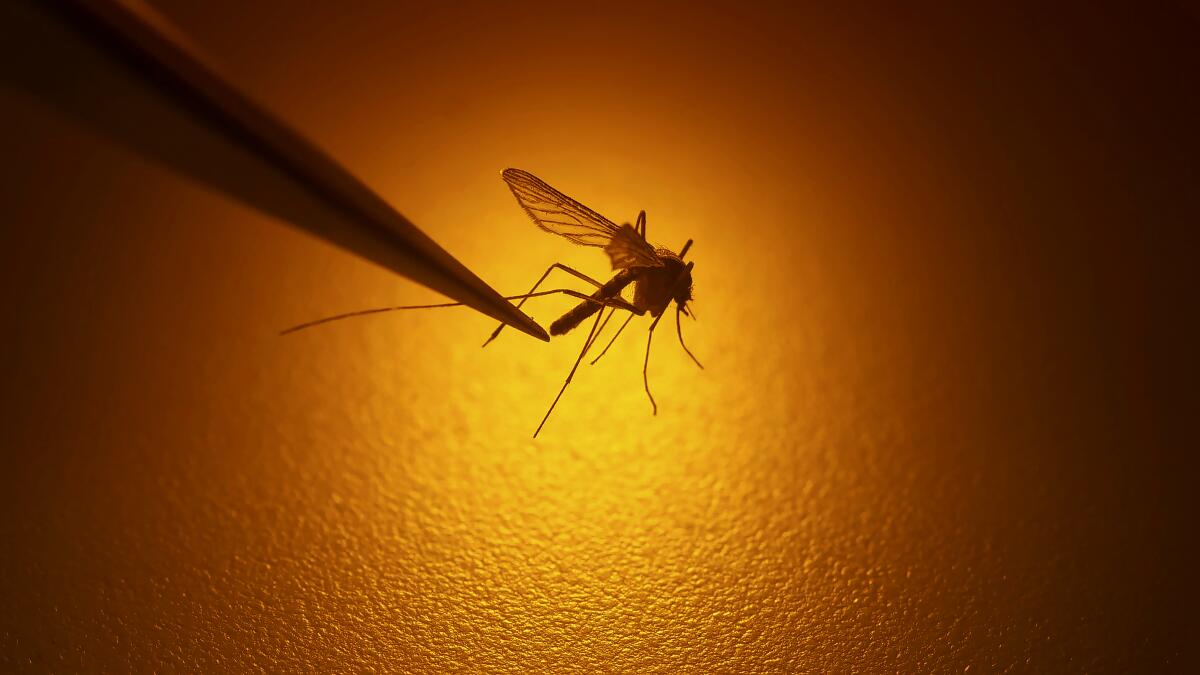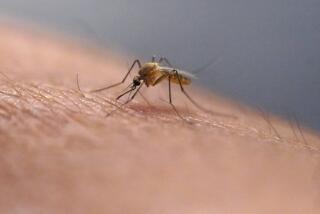West Nile virus detected in Los Angeles, Orange counties

The first West Nile virus infections of 2021 have been detected in Los Angeles and Orange counties.
An L.A. County resident who lives in the South Bay was hospitalized for a West Nile virus-induced fever in late July and is recovering, according to the Los Angeles County Department of Public Health.
And last week, the Orange County Mosquito and Vector Control District reported that a batch of mosquitoes in Fullerton tested positive for the virus, but no human cases of the virus have been reported in Orange County, spokesperson Heather Hyland said.
“You never know which mosquito has it, so that’s why we’re stressing to people to wear [protective gear],” Hyland said.
The mosquito-borne virus typically spreads to humans, horses and birds, according to the California Department of Public Health. It is common in California particularly in summer and early fall, when mosquitoes are most prevalent. Most people who become infected don’t experience symptoms, according to the Centers for Disease Control and Prevention, but about 1 in 5 develop a fever and a headache, body aches, joint pains, vomiting, diarrhea or rash.
West Nile virus results in serious illness in about 1 in 150 people, the CDC said.
Last month, someone died from West Nile virus in San Luis Obispo County, the first death of the disease in California this year. So far, the state has tracked cases in eight humans, one horse, 10 sentinel chickens, 109 dead birds and 770 mosquito samples.
The San Gabriel Valley Mosquito and Vector Control District has found 78 West Nile virus-positive mosquito samples this year in various cities, including 18 in Covina and 16 in West Covina.
California recorded its first West Nile virus-related death of year in San Luis Obispo County, but it’s unclear where the victim was infected.
“Keeping our neighborhoods safe from West Nile virus is a shared responsibility,” Aaron Arugay, executive director of the Los Angeles County West Vector Control District, said in a statement. “Residents can reduce the risk of mosquito bites by eliminating standing water in their yards and using EPA-registered repellents when mosquito activity is observed.”
In the last five years, Los Angeles County has reported an average of 118 cases per year, but officials estimate the real number is much higher because most infected people do not experience any symptoms.
Last year, there were seven deaths attributed to West Nile in L.A. County (excluding Long Beach and Pasadena, which have their own health departments) and one in Orange County.
Hyland said the numbers in Orange County are down so far this year. In 2020, the district recorded 19 human infections, she said, but there have been none in 2021. Last year, the Mosquito and Vector Control District reported 329 mosquito samples among the thousands that were tested, but this year, only two samples have been found to date, both in Fullerton.
“This is kind of new for us to see it late in the year, which is good because we don’t want West Nile virus popping around,” she said.
Approximately 94% of all West Nile cases in Orange County come from the cities of Fullerton, La Habra, Buena Park, Anaheim, Garden Grove, Orange, Santa Ana, Tustin and Huntington Beach, Hyland added. Orange County residents can sign up to receive alerts about infections on the district’s website.
There is no treatment or vaccine for West Nile virus. Public health officials recommend people protect themselves from mosquito bites by using insect repellent or lemon eucalyptus oil, wearing long pants and long-sleeved shirts when outdoors — particularly in places with lots of mosquitoes — using screens on windows and doors and cleaning out any standing water where mosquitoes like to congregate, such as bird baths, buckets, planters, saucers and other containers.
“Mosquitoes bite during the day and night,” Muntu Davis, Los Angeles County’s health officer, said in a statement, noting that “peak mosquito season” lasts from June to November in L.A. County.
More to Read
Sign up for Essential California
The most important California stories and recommendations in your inbox every morning.
You may occasionally receive promotional content from the Los Angeles Times.











